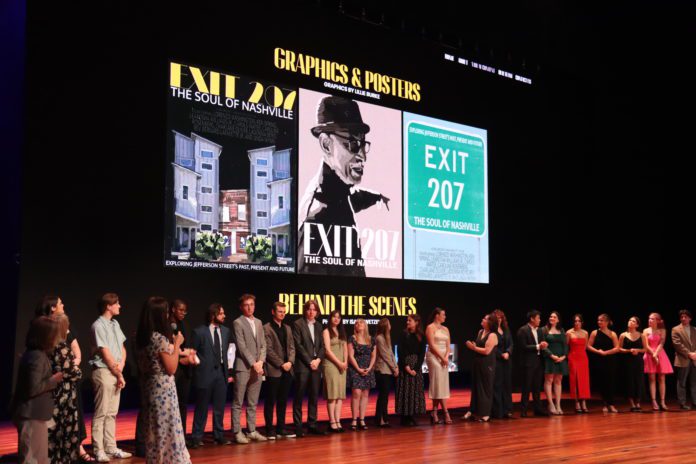In its second iteration, Belmont’s “Documentary Project” course recently premiered the film “Exit 207: The Soul of Nashville,” in the Fisher Center on May 4.
At the film’s private premiere, Nashville Public Television’s CEO Becky Magura announced that she would like to air the film on NPT, leaving a palpable gasp of excitement and overwhelming applause throughout the performance hall.
Dubbed “the ultimate group project,” the course is housed within Curb College where 19 students from various disciplines—including journalism, emerging media, motion pictures and audio engineering—collaborated to discover, examine and film all aspects of a complex human story. With research assistance from Honors students, the interdisciplinary class used those elements to write, edit and produce a short, Nashville-focused documentary throughout two semesters. In total, nearly 55 students contributed to the film representing more than 25 areas of study.
Advised by Emmy-award-winning assistant professor Jen Duck along with 30-year film editing veteran and motion pictures lecturer Jennifer Bergen, the 2022-23 Documentary Project class was instructed to find their topic by looking at Nashville through a social justice lens. Author, historian and associate professor Dr. Mary Ellen Pethel provided research direction for the project.
The team chose to study Jefferson Street in North Nashville, a historically black community whose neighborhood was deeply affected by the construction of Interstate 40 in the 1950s. Their film, “Exit 207: The Soul of Nashville,” tells the story of how the interstate highway system changed the trajectory of this once-thriving community and was made possible through the Belmont-Fisk Social Justice Collaboration.
“The difficulty of embarking on the project was immediately evident when the team sat down in September to choose a topic for this documentary,” said senior Chase Thomson, the film’s director of photography. “We came to the consensus of choosing a story that spoke to the way Nashville’s gentrification is pushing out its natives.”
While gentrification has swept throughout the city, some of the North Nashville neighborhood has remained untouched by developers, leaving remnants of the area’s rich history. The film seeks to tell the story of why the community looks drastically different today than it did prior to World War II, giving voice to the people of Jefferson Street.
“Though the story is marked by targeted gentrification and destruction, it also is one of hope, as we have discovered ways the community still thrives through the people we met and interviewed in the process of creating this documentary,” said Thomson.
In its former glory, Jefferson Street was home to prosperous businesses and rock’n’roll and rhythm and blues clubs, welcoming artists such as Jimi Hendrix, Etta James, Ella Fitzgerald, Ray Charles and Billy Cox. The film team sought to interview those directly affected by Nashville’s expansion to tell their own story, in hopes of celebrating the neighborhood’s rich culture.
“This was the place to be over here on Jefferson Street,” said Lorenzo Washington, founder of the Jefferson Street Sound Museum. “All of that has changed, and it changed when the interstate came through. The residents moved out, and when the residents start moving out, the businesses start shutting down and moving out.”
The Documentary Project team celebrated the film’s completion with a private premiere in the Fisher Center for the Performing Arts, surrounded by their families, documentary participants and members of the community.
“The students are to be applauded for this effort,” said interviewee Dr. Learotha Williams, Jr. “This project afforded the students an opportunity to gaze into the rich history of North Nashville and Jefferson Street and its prospects for the future through the eyes of some of its most beloved residents. It was a psalm of memory, intercessory prayer and a call to action to protect and preserve the history of Jefferson Street and the North Nashville community.”
Attendees were invited to ask the students questions about the film and what’s next.
Those interviewed for the project include:
- Lorenzo Washington, Founder & Curator of Jefferson Street Sound Museum
- Dr. Ken Spring, associate professor of sociology at Belmont University
- Dr. Learotha Williams, Jr., historian, and scholar at Tennessee State University
- Carlos Partee, co-founder of Nashville Black Market
- Caroline Rosenberg, relator
- Sen. Charlene Oliver, state senator
- LaDonna Boyd, president and CEO of R.H. Boyd Publishing Corporation
- Rev. Dr. Bernard Lafayette, Jr., minister, educator and civil rights advocate
- Linda Wynn, assistant director for state programs, State of Tennessee.
Following the premiere during a Q&A, an elementary-aged Metro Nashville Public Schools student asked how Belmont plans to keep this going. The resounding response was, “Through you, the community.” The next iteration of the class—slated for the 2024-2025 academic year—will continue to lean into stories the community wants to tell and will continue the foundation built through the Exit 207 film.
The documentary will enter film festivals this summer and will be available to view online concluding the festival circuit.



